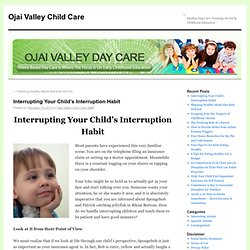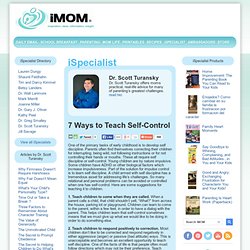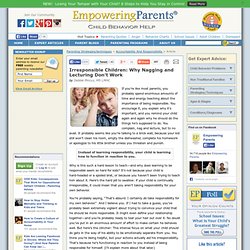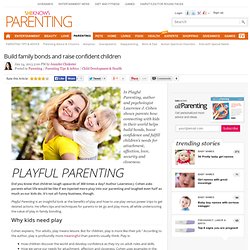

Attitude Makeover: Irresponsible. Antidote: Responsibility, Trustworthiness, Reliability"How was I supposed to know it was due today?

" Dear Dr. Borba, I'm ashamed to admit this, but our eleven year old is so irresponsible. She never takes care of her things and needs constant reminders to do her homework. Most of the time, my husband or I end up finishing it – it's almost easier then listening to her excuses. We want her to get good grades, but now I think we're going about it all wrong. . – Courtney L., a mom of three from Tucson, Arizona Any of these sound familiar? Home. 10 Strategies to Deal with Challenging and Attention Seeking Behavior. Today's question for Dr.

B (our resident early development specialist) is about challenging and attention seeking behavior in children. It was submitted by Kelly (from Dances with Chaos), who would like to perform an exorcism on her tantrum prone four-year-old (pictured left) before the little devil drives her out of her mind. Editor's Note: If the picture weren't cropped, I'm almost positive you would see the word "HANDFUL" hanging directly over his head. The strategies were written specifically for Kelly's question, but Dr.
B assures me that you can use them for almost any age. Dear Dr. On some days I have a sweet, adorable four-year-old little boy. Is he just testing me in “normal” ways? How Can Parents Model Good Listening Skills? Interrupting Your Child's Interruption Habit. Most parents have experienced this very familiar scene.

You are on the telephone filing an insurance claim or setting up a doctor appointment. Meanwhile there is a constant tugging on your sleeve or tapping on your shoulder. Your tyke might be so bold as to actually get in your face and start talking over you. Someone wants your attention, he or she wants it now, and it is absolutely imperative that you are informed about Spongebob and Patrick catching jellyfish in Bikini Bottom. How do we handle interrupting children and teach them to be patient and have good manners? Look at It from their Point of View We must realize that if we look at life through our child’s perspective, Spongebob is just as important as your insurance agent is.
Try These for Starters. Your Child's Temperament: Finding the Right Parenting Style to Match. Anyone who’s ever parented more than one child understands a fundamental truth: No two kids are alike.

Here’s what many parents don’t understand: We need to tailor our parenting styles according to each child’s individual needs and temperaments. That’s what a study published last August in the Journal of Abnormal Child Psychology reports. “There’s a lot of parenting advice out there. It seems to be based on this one-size-fits-all approach that says you need to be really warm and give your kids freedom and independence,” says Cara Kiff, a psychology resident at the University of Washington (UW) and the study’s lead author. 7 Ways to Teach Self-Control. Dr.

Scott Turansky offers moms practical, real-life advice for many of parenting’s greatest challenges. read bio One of the primary tasks of early childhood is to develop self discipline. Parents often find themselves correcting their children for interrupting, being wild, not following instructions or for not controlling their hands or mouths. These all require self discipline or self-control. Young children are by nature impulsive. Attitude Makeover: Irresponsible. Irresponsible Children: Why Nagging and Lecturing Dont Work. If you’re like most parents, you probably spend enormous amounts of time and energy teaching about the importance of being responsible.

You encourage it, you explain why it’s important, and you remind your child again and again why he should do the things he’s supposed to do. You complain, nag and lecture, but to no avail. It probably seems like you’re talking to a brick wall, because your kid still won’t clean his room, empty the dishwasher, complete his homework or apologize to his little brother unless you threaten and punish.
Build family bonds and raise confident children. Playful Parenting is an insightful look at the benefits of play and how to use play versus power trips to get desired actions.

He offers tips and techniques for parents to let go and play more, all while underscoring the value of play in family bonding. Why kids need play Cohen explains, "For adults, play means leisure. But for children, play is more like their job. " According to the author, play is profoundly more meaningful than parents usually think. How children discover the world and develop confidence as they try on adult roles and skills.How we serve our needs for attachment, affection and closeness. Play versus power trips Playful Parenting offers so many great examples of how parents can use play to get desired behaviors or outcomes, instead of resorting to punishment and power trips.
10 Strategies to Deal with Challenging and Attention Seeking Behavior. Spoiled rotten: Why you shouldn't coddle your kids. Don't give your child everything As parents, it's natural to want to give your children everything you can.

After all, we want them to be happy. And most of the time, children equate fun toys and activities with happiness. In some cases, parents also feel that they don't have enough time to parent their children, so their answer is to shower them with gifts and other things they want.